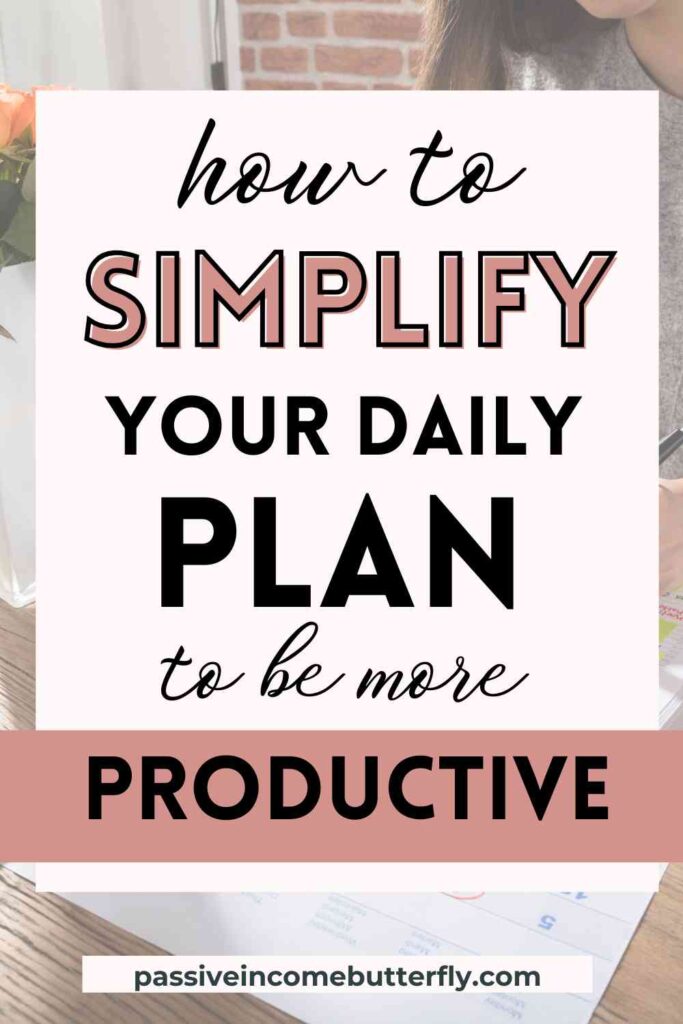Do you make a daily plan for yourself?
If you ever feel like you have a million things to do, then the end of the day comes and you feel like nothing got accomplished… maybe a plan can help you.
Planning your day can help you to prioritize your tasks, make the most of your time, and help you to not feel overwhelmed and burnt out.
There are thousands of ideas out there about how you should plan, but the truth is, none of them are a fix-all, and not every way will be right for every person.
This I can guarantee though: the planning method that works best is the one that you can actually stick to and follow. And chances are, that planning method is going to be as simple as possible.
The more complicated and time-consuming something is, the less likely you are to do it. It took me years to figure out the best way to plan, but I finally realized that (for me), the simplest way is the most effective way.
How can I simplify my planning?
If you already have a planning system, take some time to evaluate what’s working for you – and what you actually follow – and see if you can make it simpler.
I tried time blocking for a while because so many people swear by it. Long story short, it didn’t work for me, and it took me way too long to realize it.
I would plan the night before: Okay, from 9-10 I’m going to work on this, then take a break from 10-10:15, then do this from 10:15-11:30, then have lunch until 12:30….
Let me just tell you – It was so difficult for me to actually follow a schedule like that. It just didn’t work for me. I wouldn’t start my tasks on time, I wouldn’t finish my tasks on time, I’d want to keep working on something even though my schedule told me to move on…
And then I felt guilty. Because I wasn’t following the schedule, I blamed myself. I told myself I needed more willpower and focus to complete my time blocked tasks.
Eventually (thankfully!), I realized that it wasn’t a lack of discipline that was messing me up. The time-blocking method of planning just wasn’t a good fit for me.
Is your planning method working for you?
Since this article is about simplifying things, let’s keep these evaluation questions simple, shall we? Ask yourself:
- Do you consistently plan your days?
- Do you consistently follow that plan?
If the answer is ‘no’ to either of those, try something simpler and see how it changes.

Let’s see some examples of planning-made-simple…
My planning system
Here’s the planning system that works best for me – and it’s super simple.
Before I go to bed, I pull out my planner and write 4 – 5 tasks I’m going to do the next day. That’s it.
I don’t write at what time I’ll do something (unless the task is a scheduled meeting with someone else) and I don’t estimate how long it’ll take.
I draw my list of tasks to do from my master to-do list. When I think of something I need to do, I write it down there.
At the end of the day, I cross off what I’ve done (ahh, that satisfying feeling of crossing off a to-do list item). If I didn’t do one of my tasks, I choose to either move it to the next day or eliminate it altogether – because maybe I’ve realized it isn’t so important after all.
Now, some people might think, “Only 4 or 5 tasks a day? Is that all?”
Let me tell you something that I hope you will take to heart: Getting 4 to 5 good, important tasks done in a day is enough. In fact, it will probably be an above-average productive day if you do that much! (As long as the tasks are important. And if they’re not important, what are you including them in your plan for?)
(Quick note: If you put tiny reminders on your to-do list, like “send Betty a happy birthday text,” sure, you can add more than 5 items. But no more than 5 full tasks.)
Things I consider a full task:
- Doing laundry
- Going grocery shopping
- Cleaning a room in my house
- Outlining a blog article
- Writing a blog article
- Creating and posting 10 Pinterest pins
Usually a task I write down will take me 20-30 minutes to complete, sometimes up to an hour. If it’s a task that doesn’t have a clear end, I write a time amount on it. For example, “Research planning techniques – 20 minutes.”
If your task is actually a project that will take multiple steps or a significant amount of time, I recommend breaking it up into tasks of around 30 minutes. (For example, “Meal prep” changes to “Decide recipes for the week” and “Prepare veggies and rice for lunches.”)
If planning 4 – 5 tasks a day doesn’t work for you, that’s fine. You may find that 1 or 2 important tasks a day is the right number for you, or you may find that a larger number is better for you.
Jessica Massey
Another blogger with an awesome planning setup is Jessica Massey. I love her Hustle Sanely 5™ system. She suggests you do these 5 things a day:
- Your “Focus 3” tasks – the 3 things that are most important for you to get done that day
- Move for 30 minutes
- Tidy for 15 minutes
- Say Or Do One Kind Thing For Yourself
- Say or Do One Kind Thing For Someone Else
Check out more of Jess’s stuff here.
Conclusion
As you see what does and doesn’t work for you, refine your planning strategy, but don’t make it more complicated than it needs to be.
If your current method of planning is working for you, that’s great. But if you struggle to plan your days, or if you struggle to follow through on your plans, start with a super simple planning system and see how it jumpstarts your productivity and helps you feel much better about what you accomplish.
Best of luck!







